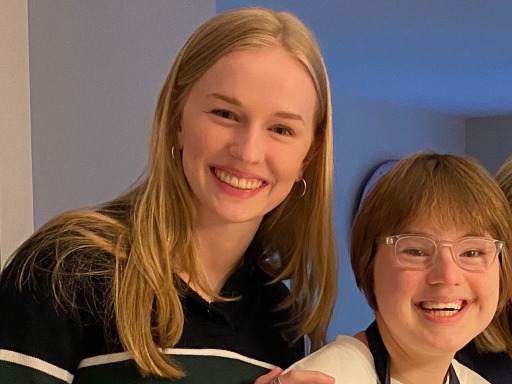When I made my arrival into this world on a chilly December afternoon, my sister Annie was five years old. Faded videotapes document her dashing down the corridors of the hospital with a gap-toothed grin stretched across her face, hollering “where’s my baby sister? I want my baby sister!” From the moment I was born, my life was changed irrevocably by Annie, in the way that my parents’ lives were changed when they found out that their first born child had Down Syndrome.
I’m seventeen now and with time has come the maturity and perspective that has allowed me to gain a clearer understanding of my relationship with my sister for all that it is, in its blessings and its challenges. She greets me with enthusiastic hugs and kisses, is one of the few people who has remained constant amid two international moves, and is always up for an early morning dance party or a Frozen movie night. The optimism, innocence, and laughter with which she navigates the world have undoubtedly taught me to be more empathetic, to enjoy the small joys of daily life, to stand up for what is right, and to most importantly trust that everything happens the way it was intended to. Her soul is unlike any other that I have encountered in this lifetime, and her smile makes all of the challenges that I have faced and will face as her sister more than worth it.
Growing up, Annie was—at least in my eyes—no different than any other big sister. We played house with dolls, argued over which movie to watch, and ran giggling along the promenade by the bay where we were raised. As I grew older, though, I slowly began to take stock of the things that the innocence of my youth had shielded me from. Despite the five years that separated us, our relationship shifted to one where I felt like the big sister (if not a third parent) in many ways. Life with Annie was marked by the sideways looks of strangers at the supermarket, the fear and laughter of other children at the playground, the discomfort of adults as they spoke to Annie in strange, loud voices before desperately looking to me for an interpretation of her response. Living overseas, the long flights we would take between Asia and the US were a particular brand of shame when my sister, unable to handle the twenty-two hour long stretches of flying, would scream and cry for hours on end.
I would spend hours on those flights trying to calm her, distract her, reprimand her, anything to quiet the horrible shrieking attracting the attention of the very unhappy people seated nearby us. When it was clear no amount of effort could end the nightmare, I would curl into myself beneath the exasperated stares of flight attendants and fellow passengers, blasting music in my headphones to drown out the noise as tears slipped quietly down my cheeks. Curling into myself was a habit that defined much of my childhood, attempting to make myself and my own struggles smaller for fear of upsetting the careful balance that my parents had worked to find despite the challenges they were presented with. It was never my parents who made me feel that sharp pressure, but rather an anxiety that I had created all on my own. Despite the plentiful love and assurance they gave to me, I could never quite shake the feeling that one small misstep would bring the world tumbling down.
Looking back, I am particularly grateful for the sacrifices my parents made to support me while raising my sister and I. Without their patience and perseverance, my experience growing up with Annie may have been an altogether different childhood lacking much of the fondness I associate with it today. They navigate any trying situation with grace and love and that is a quality we should all strive to cultivate. That being said, the lack of resources and information on and for siblings of individuals with disabilities is a significant obstacle that many families like my own have faced and continue to face.
Growing up, I wished that there were more people who understood my experiences and more opportunities to learn how to navigate my unique position. Siblings of individuals with disabilities are widely overtaxed by their multifaceted roles as siblings, caretakers, and supporters while being chronically underrepresented in advocacy, support, and awareness. I no longer feel that a small mistake will cause the world to crumble around me. But I do wish that I had not lived with that tension for so many years. As individuals who play a massive role in shaping the lives of their siblings with disabilities, the importance of addressing sibling needs cannot be overemphasized. Doing so can and will improve outcomes for individuals with disabilities, their siblings, and their families.


